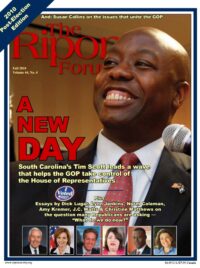
Prior to seven months ago, I had never spent more than two consecutive nights in Michigan.
Today, after spending the bulk of my career in Washington, DC, serving Senator Bob Packwood and both presidents named Bush, I find myself leading the chamber of commerce in Detroit – our Nation’s largest.
Why Detroit? Why Michigan? The answer is simple: the challenges faced by this great American city and this storied state are the precursor to the challenges of our nation. As goes Michigan goes America.
While the national media depiction of Detroit is sensationalized, there is no doubt that we face challenges. Once a top 10 state in just about every measure, we are now one of the poorest states – Alabama will surpass us in per capita income. The City of Detroit was once the wealthiest city in America – and the ghosts of our previous wealth waif through the air as reminder of what once was.
Michigan has been written off by many – and that is a mistake.
Michigan has been written off by many – and that is a mistake. A mistake because the assets of this region are tremendous and unsung. A mistake because despite my years working at a national level, I have never seen a citizenry more devoted and dedicated to their home – and now committed to its turnaround. A mistake because America should pay attention to the lessons of Michigan to avoid copying the state’s mistakes at the national level. Here’s why Michigan matters:
Manufacturing Matters
Beginning in the 1990s both Republicans and Democrats confused financial engineering with real engineering. We equated the making of money with wealth creation.
While the robustness of our financial markets is a good thing and benefited families at all levels, it does not have the same economic ripple benefits of the manufacturing enterprise. From R&D to production to logistic to marketing, the manufacturing enterprise touches multiple industries, disciplines and workforce skill levels.
Our Nation also thought that the assembly component of the manufacturing enterprise could be outsourced to other parts of the globe without impact to the other elements. We know today that is not true. As the world is comprised of more equal competitors – with their own innovative capacity – we see the R&D and innovation component following the assembly. This is a trend we cannot allow to continue.
Protecting America’s innovative edge is not a Michigan challenge, it’s an American one.
Protecting America’s innovative edge is not a Michigan challenge, it’s an American one.
Automobiles Matter
They call Detroit Motown for a reason. This city put the world on wheels and changed the world for the better – a revolution with an impact greater than the Internet.
The conventional thinking is that autos are an industry of yesterday, not tomorrow. The reality is, however, that today’s auto production encompasses leading edge alternate clean energy propulsion, lightweight composite materials, world-class logistics, clean manufacturing techniques, sophisticated consumer electronics and more.
If the sheer scope of the automobile industry does not impress, simply look at the market opportunity. Regardless the demand for these four-wheeled wonders in North America, the worldwide market will continue to grow strongly and America must capitalize on this growing market.
Regional Collaboration Matters
Michiganians frequently ask the question, “When is Washington going to help our state?” While on several issues, such as efforts to save GM and Chrysler, the federal government has indeed stepped up in a big way, I understand the frustration.
My response is always, ‘yes, what happens in Washington is important, but what’s more important is what happens in our own region.’ Economies are regional in nature, not constrained by political boundaries. While the entire state of Michigan has experienced its fair share of challenges, there is no denying that the West side of the state, anchored by Grand Rapids, has survived the great recession better than Detroit and the East side of Michigan. The difference is the sense of regional collaboration on the West side that is less prevalent on the East side.
The clear lesson learned during my time leading the Commerce Department’s Economic Development Administration is that regions that collaborate well together are more economically successful than those that don’t.
The clear lesson learned during my time leading the Commerce Department’s Economic Development Administration is that regions that collaborate well together are more economically successful than those that don’t. Michigan and the Detroit region in particular, is learning this lesson and will be stronger as a result.
Michigan Matters
The state’s economy is far more diverse than most realize. Not only is health care the Detroit region’s number one employer, our world-class medical institutions and providers have the most clinical trials in progress than any other metropolitan areas. Our technology and alternate energy industries – even those not associated with autos – are successful and leading edge. Michigan is rapidly becoming the Hollywood of the Great Lakes with substantial motion picture production.
The energy in Michigan is positive, and growing stronger. Job growth is occurring. Ford Motor Company is the poster child for the renewal of the American spirit. Labor leaders, such as Bob King of the UAW, are now partners with private industry to lower cost and improve competitiveness. Detroit’s new mayor, former NBA great Dave Bing, is all Bing and no bling – focused on the fundamentals of righting the city’s ship of state. The mid-term elections made wholesale changes in state government – a Republican clean sweep led by an out-of-the-box outsider, Rick Snyder, as Michigan’s promising new governor.
In short, it is a new day in our state – a new day with a new set of challenges. The Detroit Regional Chamber is pleased to work with numerous organizations, such as the newly formed Business Leaders for Michigan, to help drive change and meet these challenges.
We realize that not only does Michigan matter to America, but we also understand without doubt that there is a glorious future for Michigan.
It’s just different from our glorious past.
Sandy K. Baruah is the President & CEO of the Detroit Regional Chamber and previously served as the Assistant Secretary of Commerce for Economic Development and the head of the Small Business Administration under President George W. Bush.




